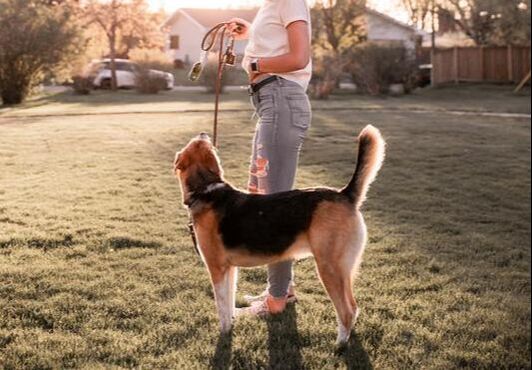|
.listen
/ˈlɪs(ə)n/ verb
noun
The phrase "my dog won't listen to me" is probably the most common one we come across when working with owners and their dogs. This is often followed by words like "stubborn", "pig headed" and "disobedient". But in most cases the dog is 'listening' but is simply not tuned in to the owner. TUNING What do we mean by tuning? Here's an example for you. Many people own horses, some of which weigh over 500kg. One thing you learn with horses is that if you want them to cooperate, take their cues from you and enjoy their experiences with you, you cannot use force (although some would disagree but that's a whole other blog). It takes daily positive interactions, regular handling and grooming, groundwork and a clear plan of what you intend to do each time you ride. Before you get on a horse, it’s safest if you’ve xalready assessed his mood, how he feels in that moment in that environment and only when you are satisfied he is relaxed and trusting of you, do you start the ride. It always has to start with 'tuning' him in to you before you both head off. With 500kg underneath you, it’s quite clear that he can easily out-power the rider. The last thing you want is him making a decision whether something is a threat or not, and reacting poorly in any way. So the 'tuning' at the very beginning of your ride is critical and will dictate how things go, how he responds and how much he listens and trusts you. With dogs it is absolutely no different, whether they are nervous, reactive or over-excitable, if they are not 'tuned' right from the start then, we guarantee you will have problems on your walk. So stop and think, what state of mind is your dog in before you leave the house, before you even clip the lead on? This is where it all starts. If you cannot calmly get your dog to stand still on sit in order to clip a lead on to your dog in your home then why on earth would you think your dog would listen to you out of the house? If the moment you open the front door and your dog nearly pulls your arm out of your socket on the lead, then it clearly says your dog is not 'tuned' in to you. When you see people being dragged down the street by a small dog? The human is just the annoying person on the end of the lead preventing them from getting where they want to go quickly enough. You must go back to basics. Patience and focus must be taught If you have skipped teaching your dog these fundamental basics because in your mind you feel you must get your dog out for his walk, then unfortunately, you too lack patience. Let go of your ideals. We know you want the perfect companion to take long walks along the beach and who hangs on your every word, but it simply doesn't just happen for the majority. Your dog needs to be educated consistently on a daily basis. And yes you will have some good days and bad days but you must be patient and keep consistent, no matter how frustrating it may seem. Tomorrow is always another day and before you know it, your dog will offer you the behaviour you want before you have even said a word. If you tune in to your dog more, then guaranteed, your dog will tune in to you more. You cannot have one without the other. There is a lovely golden rule you can use with a dog which is: "IF I STOP YOU STOP" If you stand still will the dogs stand still next to you on a short lead and not move around or sniff anything? Or will they stop on a long line at a desired range? If you want to get your dog to listen you must:
Go on, give it a try. Tune your dog into you and you may be surprised with the results.
0 Comments
|
AuthorsArticles created by the team at Allsorts Dog Training, Bay of Plenty, New Zealand Our Library
All
|
Home |
About |
|


 RSS Feed
RSS Feed